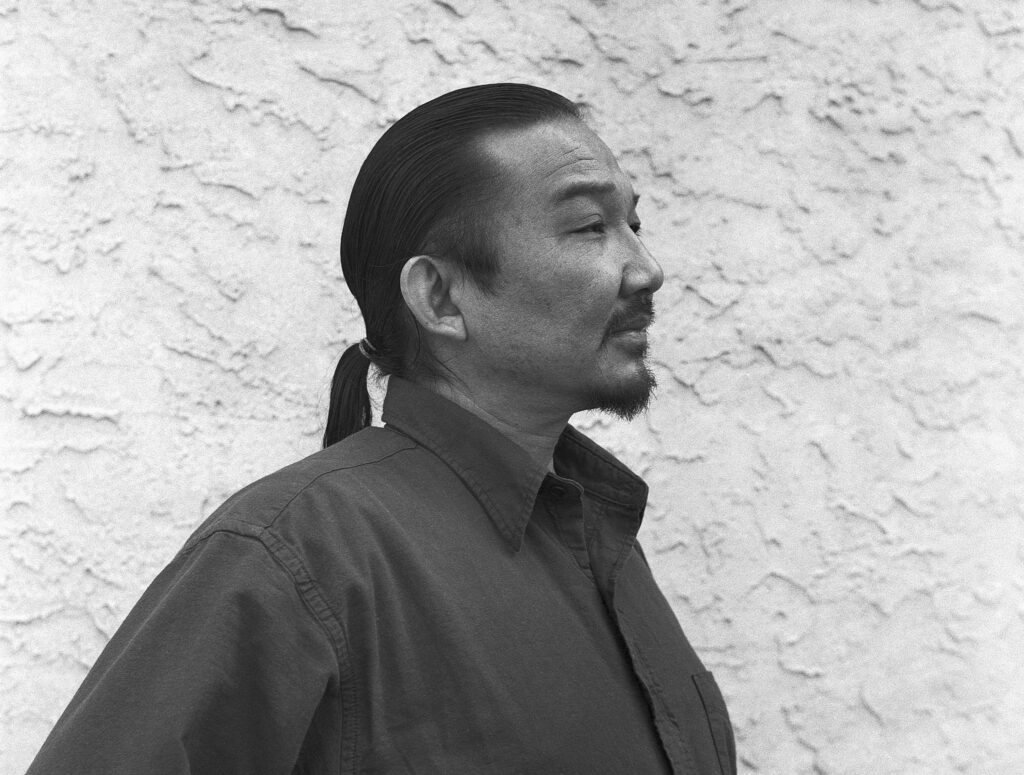
Kiyoshi Kuromiya (1943–2000) was a queer Philadelphia activist, writer, and University of Pennsylvania student whose bold, innovative activism transformed LGBTQ+ health and beyond. His work bridged movements, from civil rights and anti-war resistance to LGBTQ+ liberation and HIV/AIDS advocacy. He created a legacy that continues to shape the fight for health and justice today.
Born in a Japanese American internment camp in Heart Mountain, Wyoming during World War II, Kuromiya’s life began under systemic injustice. This early experience would resonate throughout his activism, as he became deeply committed to dismantling oppression in all its forms [Source].
Civil Rights and Early Activism
In the 1960s, Kuromiya became deeply involved in the civil rights movement. He stood among the crowds in Washington, D.C. during Dr. Martin Luther King Jr.’s historic “I Have a Dream” speech. In Montgomery, Alabama, he was beaten and trampled by police on horseback while fighting for racial justice alongside Dr. King.

Kuromiya grew close to Dr. King and his family through the movement. After King’s assassination in 1968, Kuromiya spent the week of the funeral in Atlanta, helping care for the King children.
He also joined some of the earliest LGBTQ+ demonstrations, participating in the “Annual Reminders” at Independence Hall in Philadelphia beginning in 1965 to 1969. These were the first organized LGBTQ+ rights protests in the United States and marked his public coming out as gay.

Impact at Penn
Though Kuromiya began attending University of Pennsylvania in 1961, his presence on campus and in the city extended far beyond his student years.
In April 1968, he staged what became the largest anti-war demonstration in the university’s history at the time, protesting the Vietnam War.
He posted leaflets from a fictional group called the “Americong,” claiming that an innocent dog would be burned with napalm outside Van Pelt Library. When thousands of students gathered in alarm, Kuromiya revealed the ruse and handed out new flyers: “Congratulations, you’ve saved the life of an innocent dog. How about the hundreds of thousands of Vietnamese that have been burned alive?” The protest shocked the Penn community, demonstrating his genius for blending provocation, empathy, and moral clarity to force people to confront injustice.

LGBTQ+ Organizing After Stonewall
Following the Stonewall riots in 1969, Kuromiya co-founded the Philadelphia chapter of the Gay Liberation Front and co-produced The Gay Dealer, the city’s first gay newspaper. He amplified queer voices through media and organizing, reinforcing his belief that information could change minds and mobilize communities.
In the early 1970s, Kuromiya helped establish Penn’s first gay student organization, the “Gay Coffee Hour.” It offered one of the earliest open spaces for LGBTQ+ students on campus, providing an alternative to bars.
Kuromiya also served as an openly gay delegate to the Black Panther Party Convention in 1970, further demonstrating his lifelong belief that struggles for racial, sexual, and class justice were interconnected.

Leadership in the AIDS Movement
When the HIV/AIDS epidemic struck in the 1980s, Kuromiya brought the same creativity and urgency to AIDS activism. Diagnosed with HIV himself in 1989, he recognized the life-or-death importance of accurate, accessible information and soon became a self-taught expert on the disease.
He became a central figure in ACT UP Philadelphia and edited ACT UP’s Standard of Care, the first medical treatment and cultural competency guidelines created by and for people living with HIV.

His groundbreaking Critical Path AIDS Project reflected his lifelong mantra that “knowledge is power.” Through hotlines, newsletters, email lists, and one of the earliest HIV/AIDS websites, he provided free, lifesaving health information to thousands. He even offered free internet access to people living with HIV, ensuring information reached those most in need. At a time when digital networks were still new, Kuromiya’s work was remarkably innovative, using emerging technologies to democratize health information.
In 1997, Kuromiya took his fight all the way to the U.S. Supreme Court as a plaintiff, helping strike down the “Communications Decency Act” and defend the right to share HIV/AIDS information online at a time when digital access was still new and contested [Source].
“My role,” Kuromiya said, “is fighting to continue to provide these services, telling the truth to power.”

A Life of Resistance
Kuromiya never stopped organizing. In October 1999, just a year before his death, he participated in a protest at the U.S. Trade Representative’s office in Washington, D.C., demanding access to affordable HIV medications worldwide. It was his final act of civil disobedience, captured in a photo that shows him throwing his body against a wall in defiance.
Kiyoshi Kuromiya passed away in 2000 from complications related to AIDS and cancer. His activism laid the groundwork we continue to build on today in the fight for health equity and social justice.

Honoring His Legacy at Penn
As a Penn student and a lifelong Philadelphian, Kuromiya’s story is deeply tied to our city and our university. His activism reminds us that LGBTQ+ health is inseparable from larger struggles for justice, dignity, and access to care.
This LGBTQ+ History Month, we honor his life, his courage, and his enduring impact.
Join us for Kiyoshi Day
On October 30, 2025, join us at Penn’s Van Pelt Library for a symposium and a screening of a documentary-in-progress on Kuromiya’s life. We invite you to learn more about this powerful activist whose fight for liberation still resonates today.
RSVP here: asam.sas.upenn.edu/events/2025/10/30/kiyoshi-day-symposium
